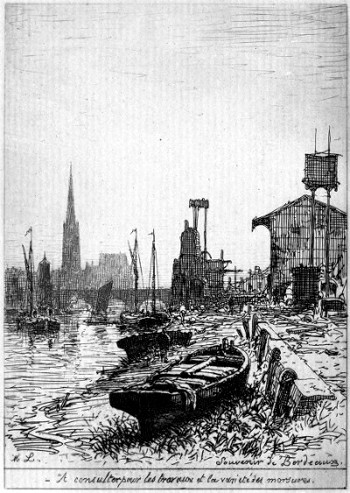A TREATISE ON ETCHING.
“Amongst Frenchmen Claude is the best landscape etcherof past days, and Lalanne
the best of the present day.”—P. G. Hamerton.

A TREATISE
ON
ETCHING.
TEXT AND PLATES
BY
MAXIME LALANNE.
AUTHORIZED EDITION, TRANSLATED FROM THESECOND FRENCH EDITION
BY
S. R. KOEHLER.
WITH AN INTRODUCTORY CHAPTER AND NOTES BY THETRANSLATOR.
BOSTON:
ESTES AND LAURIAT,
Publishers.
Copyright,By Estes and Lauriat.1880.
University Press:John Wilson and Son, Cambridge.
TRANSLATOR'S PREFACE.
So much interest has of late years been shown in England inthe art of etching, that it seems hardly necessary to apologize forbringing out an English edition of a work on the subject from thepen of an artist whom a weighty English authority has pronouncedto be the best French landscape-etcher of the day. It might beurged, indeed, that more than enough has already been writtenconcerning the technical as well as the æsthetic side of etching.But this objection is sufficiently met by the statement of the factthat there is no other work of the kind in which the processesinvolved are described in so plain and lucid a manner as in M.Lalanne's admirable “Traité de la Gravure à l'Eau-forte.” In thelaudable endeavor to be complete, most of the similar books nowextant err in loading down the subject with a complicated massof detail which is more apt to frighten the beginner than to aidhim. M. Lalanne's Treatise, on the contrary, is as simple as agood work of art.
It may, however, be incumbent upon me to offer a few words ofexcuse concerning my own connection with the bringing out ofthis translation; for, at first sight, it will, no doubt, appear theheight of presumption, especially on the part of one who is nothimself a practising artist, to add an introductory chapter andnotes to the work of a consummate master on his favorite art.But what I have done has not, in any way, been dictated by thespirit of presumption. The reasons which induced me to makethe additions may be stated as follows.
It is a most difficult feat for one who has thoroughly mastered[Pg vi]an accomplishment, and has practised it successfully for a lifetime,to lower himself to the level of those who are absolutely uninformed.A master is apt to forget that he himself had to learncertain things which, to him, seem to be self-evident, and he thereforetakes it for granted that they are self-evident. A practisedetcher thinks nothing of handling his acid, grounding and smokinghis plate, and all the other little tricks of the craft which, to abeginner, are quite worrying and exciting. It seemed to me best,therefore, to acquaint the student with these purely technical difficulties,without complicating his first a